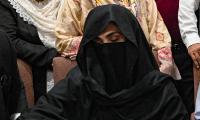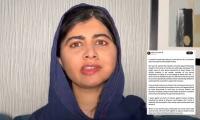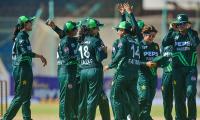Rawalpindi
After the setting in of summer, the number of child and infant patients with diarrhoea, typhoid and malaria is on the rise and the incidence of respiratory tract infections among children is showing a downward trend.
The data collected by ‘The News’ on Thursday has revealed that nearly 50 per cent of all child patients and infants taken to paediatrics departments here at the allied hospitals in town are with complaints of diarrhoea.
Two of the three teaching hospitals in town, namely Benazir Bhutto Hospital and Holy Family Hospital, operate paediatrics departments. According to the data collected by ‘The News’, the two hospitals are receiving nearly 300 child patients including infants daily on average with complaints of diarrhoea.
With the setting in of hot weather, the incidence of diarrhoea has increased and a greater number of child and infant patients with diarrhoea, enteric fever and malaria are being reported at the paediatrics departments at HFH and BBH, said Head of Paediatrics Department at Rawalpindi Medical College and allied hospitals Professor Dr. Rai Muhammad Asghar while talking to ‘The News’ on Thursday.
He said at present, not less than 50 per cent of total child patients reaching allied hospitals are with complaints of diarrhoea mainly with acute watery diarrhoea because of viral or E-coli infections. The child patients reaching allied hospitals with severe dehydration are admitted to wards but with mild to moderate dehydration are given ORS (Oral Rehydration Solution), he said.
Talking of trend, he said the number of child cases with diarrhoea would continuously be on the rise with the rise in temperature as it happens every year. He added that health education among parents is important to avoid seasonal infections including diarrhoea.
As the transmission of diarrhoea is through faecal-oral route, it can be avoided by adopting simple hygienic principles, said Dr. Rai. To avoid diarrhoea and like infections, hand washing with soap before eating and after going to toilet is a must and children and infants must be given boiled water for drinking, he said. Drinking water must be boiled for at least five minutes before cooling down as five minutes boiling kills all organisms causing diarrhoea and typhoid, he added.
To a query, he said vaccination under Expanded Programme on Immunisation and breast feeding for at least two years safeguards a child from seasonal infections. Parents should avoid feeding children with bottles (feeders) as it is a major risk factor for diarrhoea, he said. Parents should avoid feeders and soothers, he said.
He said malnourished children are at greater risk of contracting diarrhoea and like infections. He said the best treatment for diarrhoea is to prevent child patient from dehydration and for that soon after incidence of diarrhoea, a child should be started ORS.
Parents must be aware of the fact that mortality among children with diarrhoea is not because of infection instead it is because of dehydration that should be avoided after incidence of infection through ORS, said Professor Rai while responding to a query.
He said Low-Osmolar ORS is better than the old version of ORS as it reduces the episodes of diarrhoea more rapidly. He advised parents to not to give ORS through feeders (Feeding Bottle) which is a major source of infection instead the ORS should be given through cup and spoon that helps stopping vomiting among children. One spoon of ORS after every minute should be given to a child patient in case of severe diarrhoea, he said.
He suggested that in case of dehydration, a child should be given more fluids. Feeding of the child or infant having diarrhoea should not be stopped. If the patient is over six months of age, the child should be given banana, yogurt and rice in the form of ‘Khichri’, he said and added that Zink syrup should be given to a child patient of diarrhoea for 14 days.
To a query, he said in most of the cases of diarrhoea among children, there would be vomiting but no anti-emetic drugs should be given to stop vomiting as it may cause serious harms. Anti-diarrhoea drugs and anti-biotic are also contra indicated in majority of cases of diarrhoea, in over 70 per cent of the cases, though they may be used by physicians for treatment in cases of bloody diarrhoea, said Dr. Rai. He explained that Rota virus and E-coli diarrhoea are self-limiting and can be managed through ORS only.
To avoid infections including cholera and diarrhoea, Dr. Rai said children should be given clean drinking water but not mineral water. Schoolchildren should be advised to not to consume locally prepared juices and ice lollies prepared at vendors as these might cause typhoid and diarrhoea, he said.
A delegation from Timor-Leste, headed by Ms Veronica Das Dores, Minister of Social Solidarity and Inclusion, on a...
Pakistani Ambassador to China Khalil Hashmi seen in this image. — APP/FileIslamabad:China-Pakistan investment and...
In this image, Child Protection Institute building can be seen. — X/@mohrpakistan/File Islamabad: Child Protection...
The National University of Modern Languages building seen in this image released on November 11, 2022. —...
President of the International Islamic University Islamabad , Prof Dr Hathal bin Hamoud Al-Otaibi, and Rector IIUI, Dr...
A representational image of a handcuffed person behind bars. — AFP/FileRawalpindi:In a significant breakthrough,...







